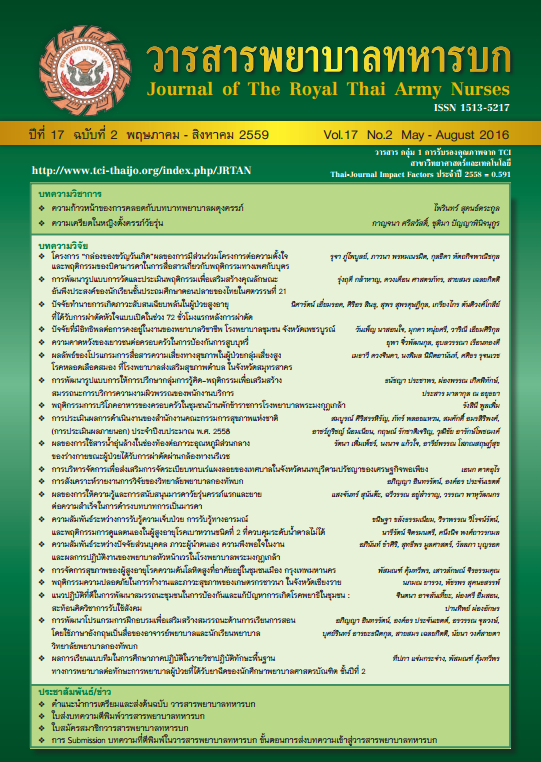ปัจจัยทำนายการเกิดภาวะสับสนเฉียบพลันในผู้ป่วยสูงอายุที่ได้รับการผ่าตัดหัวใจแบบเปิดในช่วง 72 ชั่วโมงแรกหลังการผ่าตัด
Keywords:
ภาวะสับสนเฉียบพลัน, ผู้สูงอายุ, การผ่าตัดหัวใจแบบเปิด, delirium, elderly, open heart surgeryAbstract
งานวิจัยเชิงบรรยายนี้มีวัตถุประสงค์เพื่อศึกษาอัตราการเกิดภาวะสับสนเฉียบพลันและอิทธิพลของระดับอัลบูมินในกระแสเลือด, ปฏิกิริยาตอบสนองต่อการอักเสบทั่วร่างกาย, ระยะเวลาการผ่าตัด, ระดับความปวด และภาวะซึมเศร้า ต่อการเกิดภาวะสับสนเฉียบพลันผู้ป่วยสูงอายุที่ได้รับการผ่าตัดหัวใจแบบเปิดในระยะ 72 ชั่วโมงแรกหลังการผ่าตัด กลุ่มตัวอย่างคือผู้ป่วยสูงอายุ(อายุ ≥60 ปี) ที่ได้รับการผ่าตัดหัวใจแบบเปิดที่โรงพยาบาลศิริราช จำนวน 150 ราย โดยเลือกกลุ่มตัวอย่างตามคุณสมบัติที่กำหนดเครื่องมือวิจัยประกอบด้วย แบบบันทึกข้อมูลส่วนบุคคล แบบประเมินสมรรถภาพสมองของไทย แบบวัดความเศร้าในผู้สูงอายุของไทย แบบประเมินกลุ่มอาการตอบสนองต่อการอักเสบทั่วร่างกาย แบบประเมินความปวด และแบบประเมินภาวะสับสนเฉียบพลันวิเคราะห์ข้อมูลโดยใช้สถิติเชิงบรรยายและสถิติถดถอยโลจิสติกส์ผลการวิจัยพบว่ากลุ่มตัวอย่างเกิดภาวะสับสนเฉียบพลันหลังผ่าตัดร้อยละ 35.3 ระดับอัลบูมินในกระแสเลือด, ปฏิกิริยาตอบสนองต่อการอักเสบทั่วร่างกาย, ระยะเวลาการผ่าตัด, ระดับความปวด และภาวะซึมเศร้าร่วมกันทำนายการเกิดภาวะสับสนเฉียบพลันผู้ป่วยสูงอายุที่ได้รับการผ่าตัดหัวใจแบบเปิดในช่วง 72 ชั่วโมงแรกหลังการผ่าตัดได้ร้อยละ 54.2 (Nagelkerke R2 = .542,p <0.05) และพบว่าปัจจัยที่สามารถทำนายการเกิดภาวะสับสนเฉียบพลันได้แก่ กลุ่มอาการตอบสนองต่อการอักเสบทั่วร่างกายระยะเวลาการผ่าตัด, ระดับความปวด, และภาวะซึมเศร้า สามารถร่วมกันทำ นายการเกิดภาวะสับสนเฉียบพลันอย่างมีนัยสำคัญทางสถิติ (β = 1.508, p = 0.004; β = .007, p = 0.004; β = .623, p = 0.001; β = 2.750, p = 0.000 ตามลำดับ) ดังนั้นบุคลากรทางการแพทย์ควรมีการเฝ้าระวัง คัดแยกผู้ป่วยสูงอายุกลุ่มเสี่ยงต่อการเกิดภาวะสับสนเฉียบพลัน ได้แก่ ผู้ป่วยที่มี ปฏิกิริยาตอบสนองต่อการอักเสบทั่วร่างกาย, มีระยะเวลาการผ่าตัดนาน , มีระดับความปวดสูง และมีภาวะซึมเศร้าให้ได้รับการดูแลอย่างใกล้ชิดโดยเฉพาะในช่วงหลังผ่าตัดหัวใจ และควรมีการสร้างแนวปฏิบัติในการประเมินภาวะสับสนเฉียบพลันหลังผ่าตัด โดยประเมินภาวะสับสนเฉียบพลันทุกเวร เพื่อลดระยะเวลาการพักรักษาตัวในโรงพยาบาลและลดค่าใช้จ่ายในการรักษา
Predictors Of Delirium In The Elderly Patients Undergone Open Heart Surgery In The First 72 Hours After Surgery
This research was a descriptive study aimed to study the incidence of deliriumand the predictive
power of the level of albumin in the bloodstream, the Systemic Inflammatory Response Syndrome (SIRS), duration of surgery, pain and the depression that effect delirium in elderly patients who have undergone open-heart surgery within the first 72 hours. The sample comprised of 150 elderly patients (aged ≥ 60 years) who had received open heart surgery at Siriraj Hospital. Data was collected from the patients ’general records, the Thai Mental State Exammination (TMSE), the Thai Geriatric Depression Scale (TGDS), the Systemic Inflammatory Response Syndrome (SIRS) scale, the Pain score and the Confusion Assessment Method-Intensive Care Unit (CAM-ICU). Data were analyzed using descriptive statistic and Logistic regression test. The results showed that 35.3% of the patients had acute onset of delirium occurring right after the operations. The level of albumin in the bloodstream, the Systemic Inflammatory Response Syndrome (SIRS), duration of surgery, pain and the depression jointly predicted delirium for 54.2% (Nagelkerke R2 = .542, p <. 0.05). The Systemic Inflammatory Response Syndrome (SIRS), duration of surgery, pain and the depression significantly predicted delirium in elderly patients who have undergone open-heart surgery within the first 72 hours (β = 1.508, p = 0.004; β = .007, p = 0.004; β = .623, p = 0.001; β = 2.750, p = 0.000 respectively). The recommendations from this study were that medical staff should monitor the elderly patients who can be at high risk of delirium by evaluating their systemic inflammatory response syndrome, a long duration of surgery, higher level of pain and depression. These patients should be observed closely, especially postoperative heart surgery patients. The medical staff should create guidelines for assessment of delirium or acute delirium in every shift. This practice would help to reduce the duration of treatment and the cost of the patients’ care in the hospitals.
Downloads
Downloads
How to Cite
Issue
Section
License
บทความหรือข้อคิดเห็นใดใดที่ปรากฏในวารสารพยาบาลทหารบกเป็นวรรณกรรมของผู้เขียน ซึ่งบรรณาธิการหรือสมาคมพยาบาลทหารบก ไม่จำเป็นต้องเห็นด้วย
บทความที่ได้รับการตีพิมพ์เป็นลิขสิทธิ์ของวารสารพยาบาลทหารบก
The ideas and opinions expressed in the Journal of The Royal Thai Army Nurses are those of the authors and not necessarily those
of the editor or Royal Thai Army Nurses Association.






